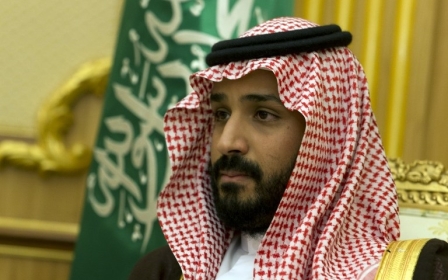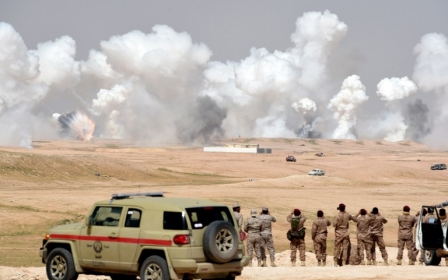Will Saudi Arabia take the battle to Iran - with America's blessing?

Saudi Deputy Crown Prince Mohammed bin Salman's extremely dangerous remarks concerning Iran this week signal a much harsher stance from the kingdom that go beyond the condemnation and severing of ties that took place in January 2016.
Bin Salman's comments were made during an hour-long interview on Tuesday, broadcast simultaneously on several public and private TV stations in Saudi and other Gulf Cooperation Council (GCC) countries, an unusually widespread interview underlining its importance.
'We will not wait until the fight is inside Saudi Arabia and we will work so that the battle is on their side, inside Iran'
- Saudi Deputy Crown Prince Mohammed bin Salman
The deputy crown prince spoke at length about several domestic and economic issues which aimed to address local concerns about the Saudi economy. Then he turned to regional issues and, of course, spoke on Iran.
When asked about dialogue with Saudi's regional rival, he basically slammed the door on any future possibility: "How do I have a meaningful dialogue, with an individual, or a regime, that has a solid conviction ... that his regime is built on an extremist ideology stated in his constitution and stated in the will of [the late Iranian leader Ayatollah Ruhollah] Khomeini that they must control ... the Islamic world and spread their own Twelver Jaffari way in all of the Islamic world until the Mehdi arrives. How do I convince him?"
Bin Salman went on to say what many analysts and observers in the GCC have openly stated and warned about, but no Saudi official had yet discussed publicly.
"We know that the aim of the Iranian regime is to reach the focal point of Muslims [Mecca],” he said, then adding remarkably: "We will not wait until the fight is inside Saudi Arabia, and we will work so that the battle is on their side, inside Iran, not in Saudi Arabia."
Regional consensus against Iran
These kinds of remarks would not be uttered haphazardly from the deputy crown prince, who holds key portfolios in Saudi Arabia.
Most importantly, he is minister of defence, chief of the house of Saud royal court and chairman of the Council of Economic and Development Affairs. Late last month, a national security centre was established under the royal court which he heads.
His remarks come in the midst of a regional consensus, with the backing of the US, forming against Iran.
Immediately after bin Salman's return from his trip to the US, hailed as a "turning point" by US President Donald Trump, the Egyptian ministry of foreign affairs swept recent Saudi-Egyptian tensions away, instead stating the "strategic" importance of relations between the Arab world's two traditional heavyweights and criticising Iran's interference in the region.
►Read more: An Arab NATO? That's a long way off
There have also been reports about the prospects of a "Middle Eastern NATO" that would include US Arab allies and Israel for the specific purpose of countering Iran.
Iran's domestic vulnerabilities
Bin Salman is not the first one to talk about taking the battle to Iran.
Deputy US national security adviser Kathleen "KT" McFarland has repeatedly talked about stirring discontent inside Iran. Specifically, she has suggested exploiting the unmet aspirations of young Iranians, held back by internet censorship.
"They have promised their people an awful lot, and, if they can't deliver, they'll have domestic security problems."
In his interview, bin Salman made similar remarks about the disappointments of Iranian youth, whom he said Iran had deprived of development for 30 years, instead pursuing extremist ideology and expansionism.
The unmet aspirations for freedom and better standards of living of Iranian youth were perhaps most clearly expressed after Mahmoud Ahmadinejad was announced victor for a second term after the Iranian presidential elections in 2009.
Protests erupted after accusations of widespread fraud and violations in the electoral process. The protests were led by opposition candidates in the election - Mir Hossein Mousavi and Mehdi Karroubi - and became known as Jonbesh-e Sabz, or the Green Movement. Millions of Iranians who took to the streets were ultimately met by the brute force of Iranian security forces, resulting in many deaths, and followed by the arrest of hundreds of people, including prominent political figures.
In a fiery speech in support of Ibrahim Raisi, the leading conservative presidential candidate in Iran, Hassan Abbasi, a Revolutionary Guard Corps officer and main conservative strategist, said that "in the near future" Mousavi, Karroubi and former president Seyyed Mohammad Khatami would be put on trial and then executed.
Ethno-religious discrimination
One can dwell much on the silencing and crackdown that the opposition still faces in Iran. However, such tensions are not the only source of vulnerability for the Iranian regime.
Iran's skilful diplomacy may not be enough this time to stop the regional voices calling for action against it
Iran is a multi-ethnic, multilingual, and multi-religious country, a diversity that is not always respected by the regime. Sunnis in Iran, who number in the millions, are harshly mistreated and do not even have a single mosque in Tehran or any of the major cities such as Isfahan, Shiraz and Mashhad. Authorities regularly destroy the private spaces that Sunnis create away from public sight.
Iran also has a considerable Kurdish population who have had their share of oppression. Similarly, Arabs of the Ahwaz – an area in southern Iran that borders Iraq - have frequently expressed dissent over racism and marginalisation, although the discrimination is not based on religion as the majority are Shia. Similarly, the Baloch in the east, who live in the poorest and most undeveloped regions of the country, face oppression and have separatist militant organisations there.
►Read more: Why America's call to escalate militarily against Iran is dangerous
These are all serious and grave vulnerabilities for the Iranian regime that could be exploited from abroad. Unsurprisingly, a couple of days after bin Salman's comments, Iran's minister of foreign affairs described the January 2016 attack on the Saudi embassy in Tehran, which resulted in the breaking down of relations, as "stupidity and a historic betrayal".
With US backing, Saudi Arabia could very well act upon bin Salman's proposition in the future and, if Iran maintains its policies in the region, it would not be surprising.
There are voices within the GCC who have already called for such action. This time, Iran's skilful diplomacy may not be enough to stop these voices, and a change in its regional policies may be necessary.
- Mustafa Salama is a political analyst, consultant and freelance writer with an academic background in Middle East Affairs.
The views expressed in this article belong to the author and do not necessarily reflect the editorial policy of Middle East Eye.
Image: US President Donald Trump and Saudi Deputy Crown Prince and Defence Minister Mohammed bin Salman speak to the media in the Oval Office at the White House in Washington DC on 14 March 2017 (AFP)
This article is available in French on Middle East Eye French edition.
Middle East Eye propose une couverture et une analyse indépendantes et incomparables du Moyen-Orient, de l’Afrique du Nord et d’autres régions du monde. Pour en savoir plus sur la reprise de ce contenu et les frais qui s’appliquent, veuillez remplir ce formulaire [en anglais]. Pour en savoir plus sur MEE, cliquez ici [en anglais].








